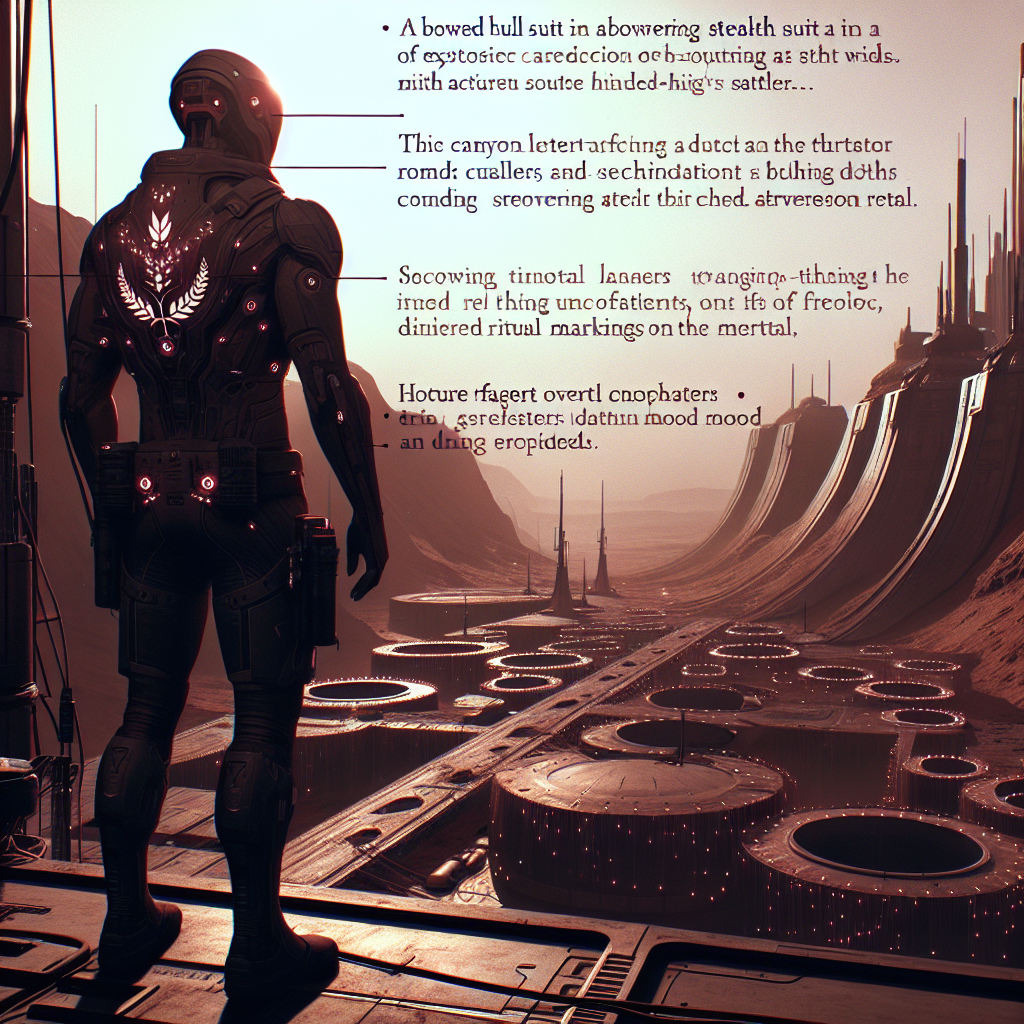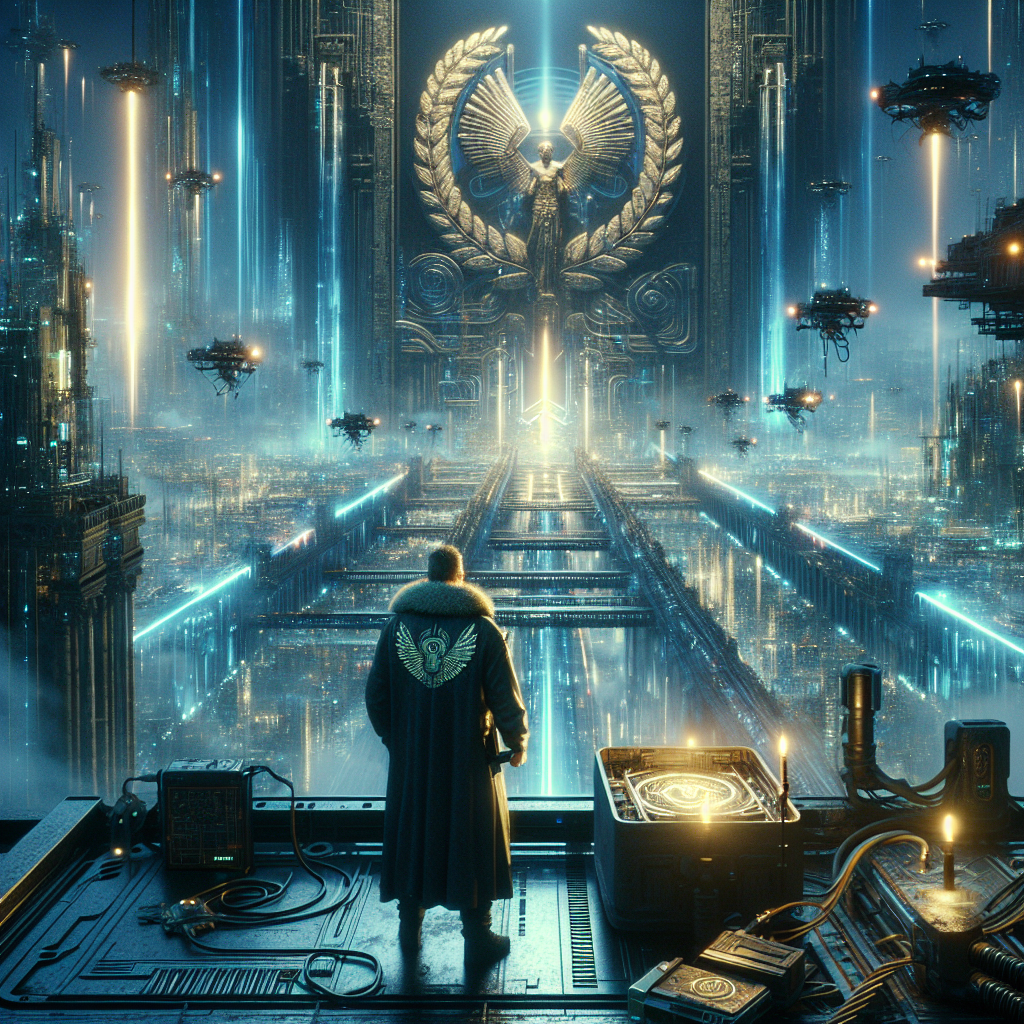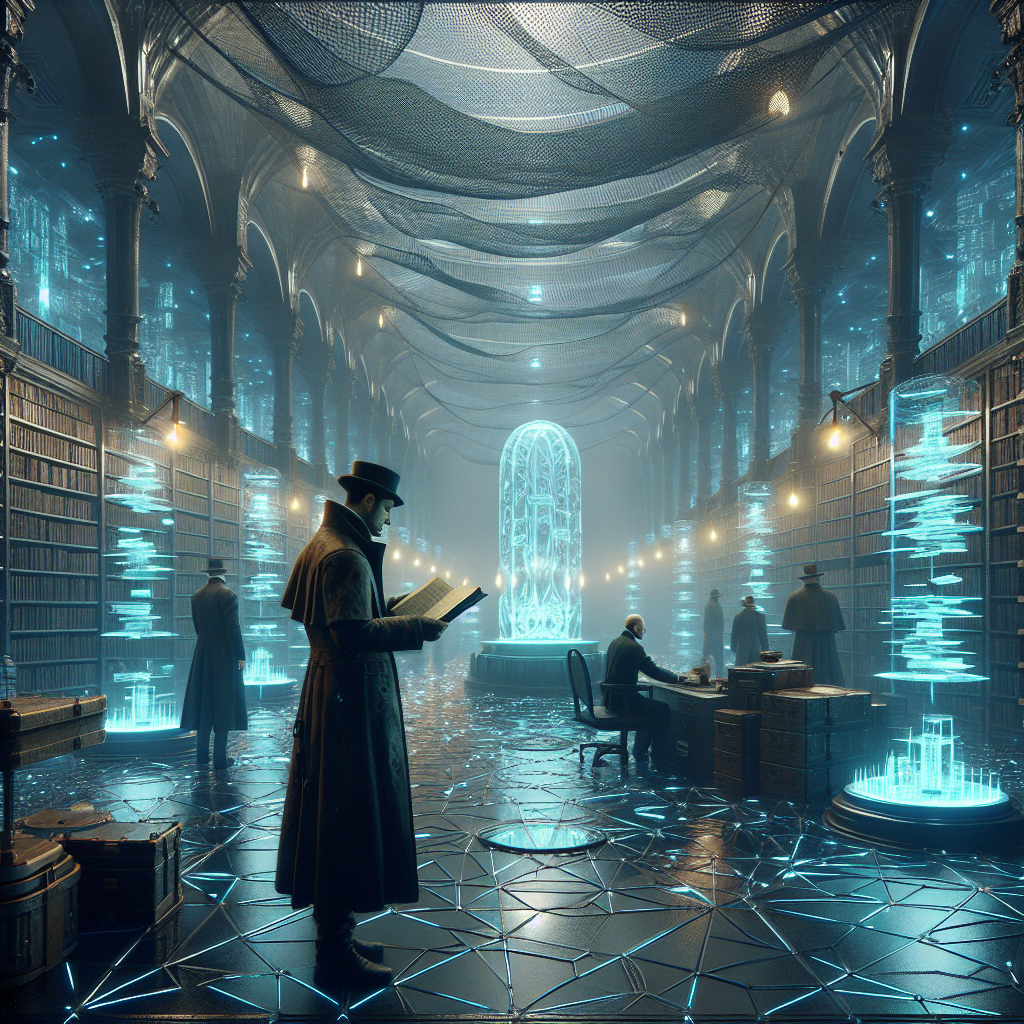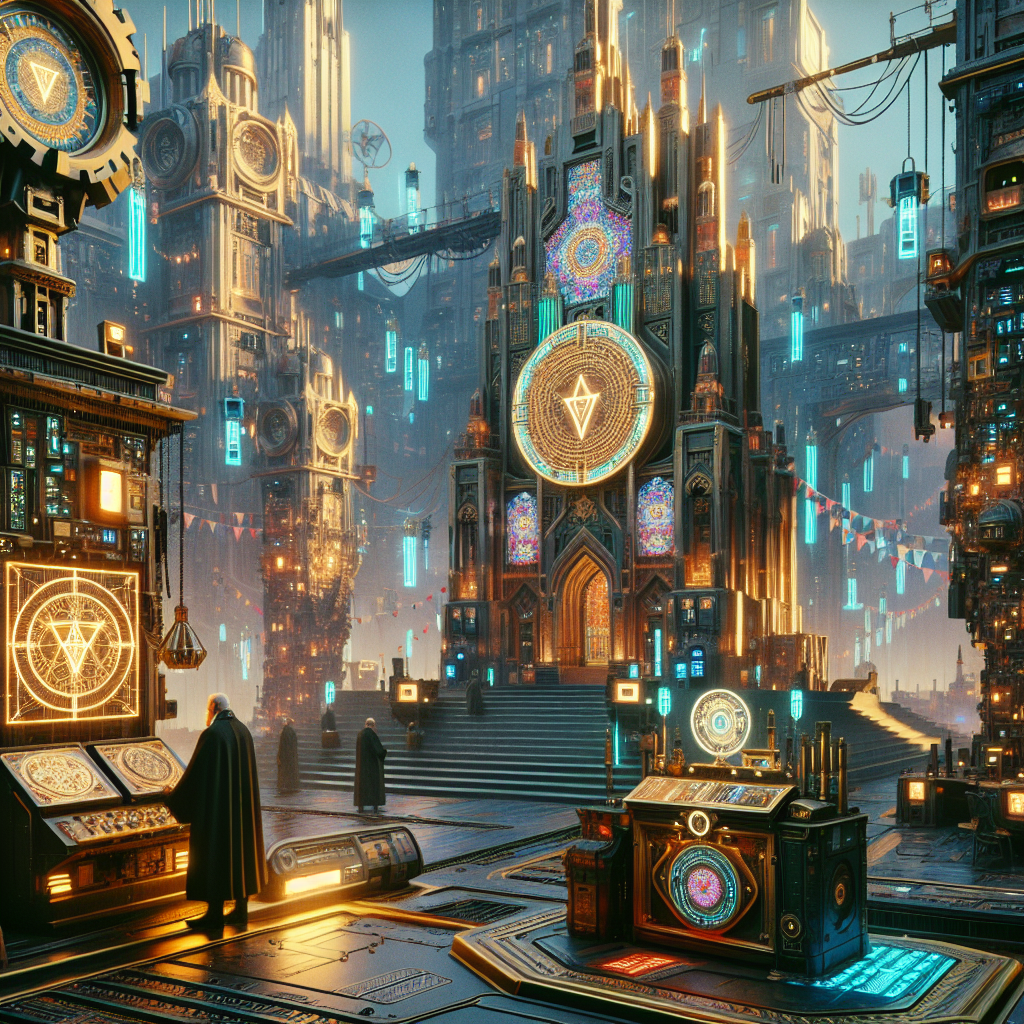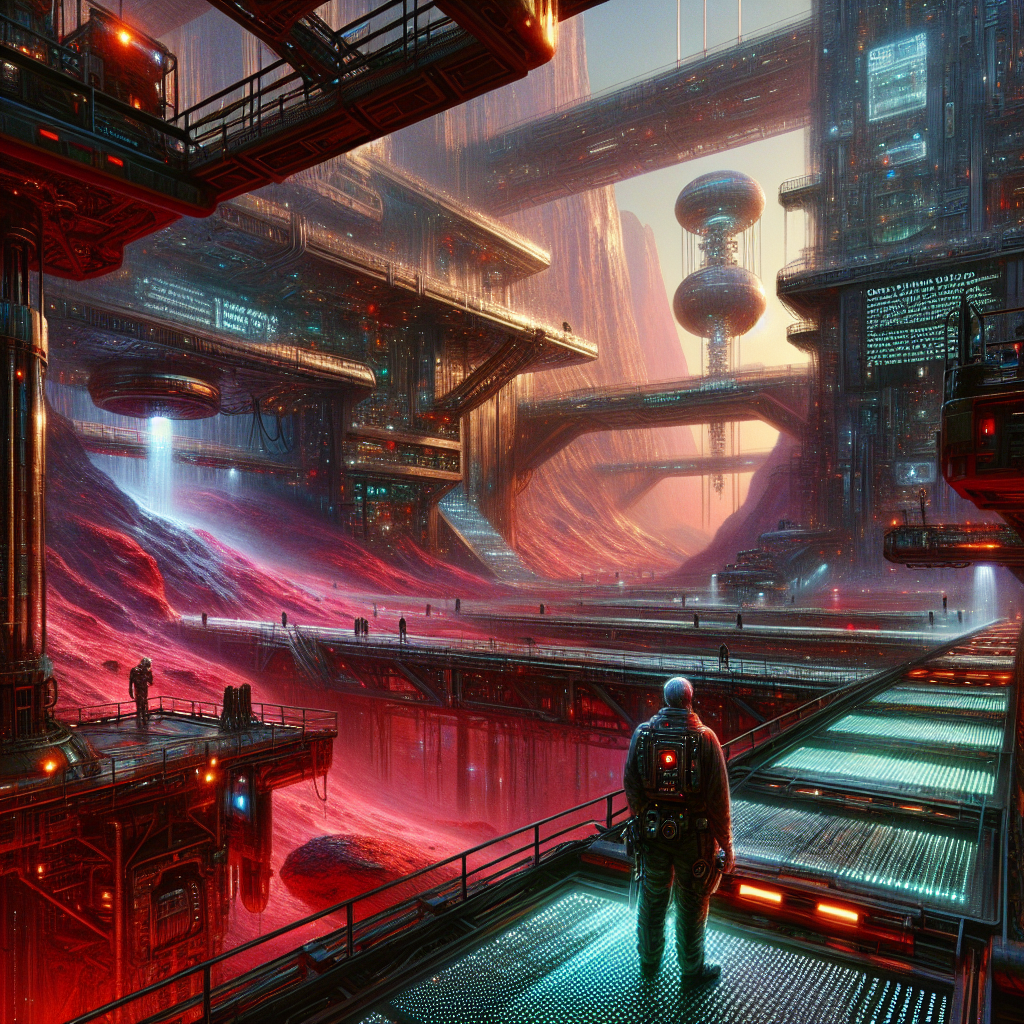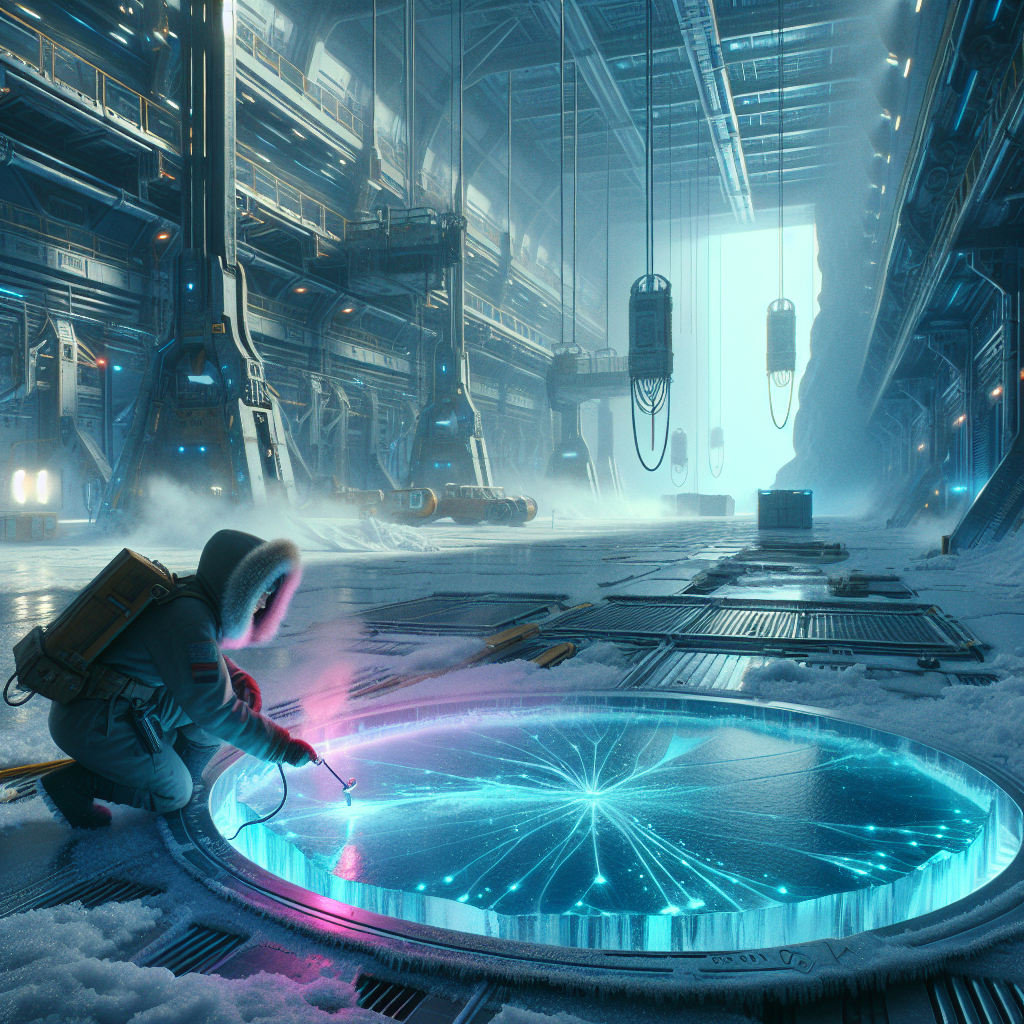Chapter 2 – Ledger Ghosts and the Laurel Code
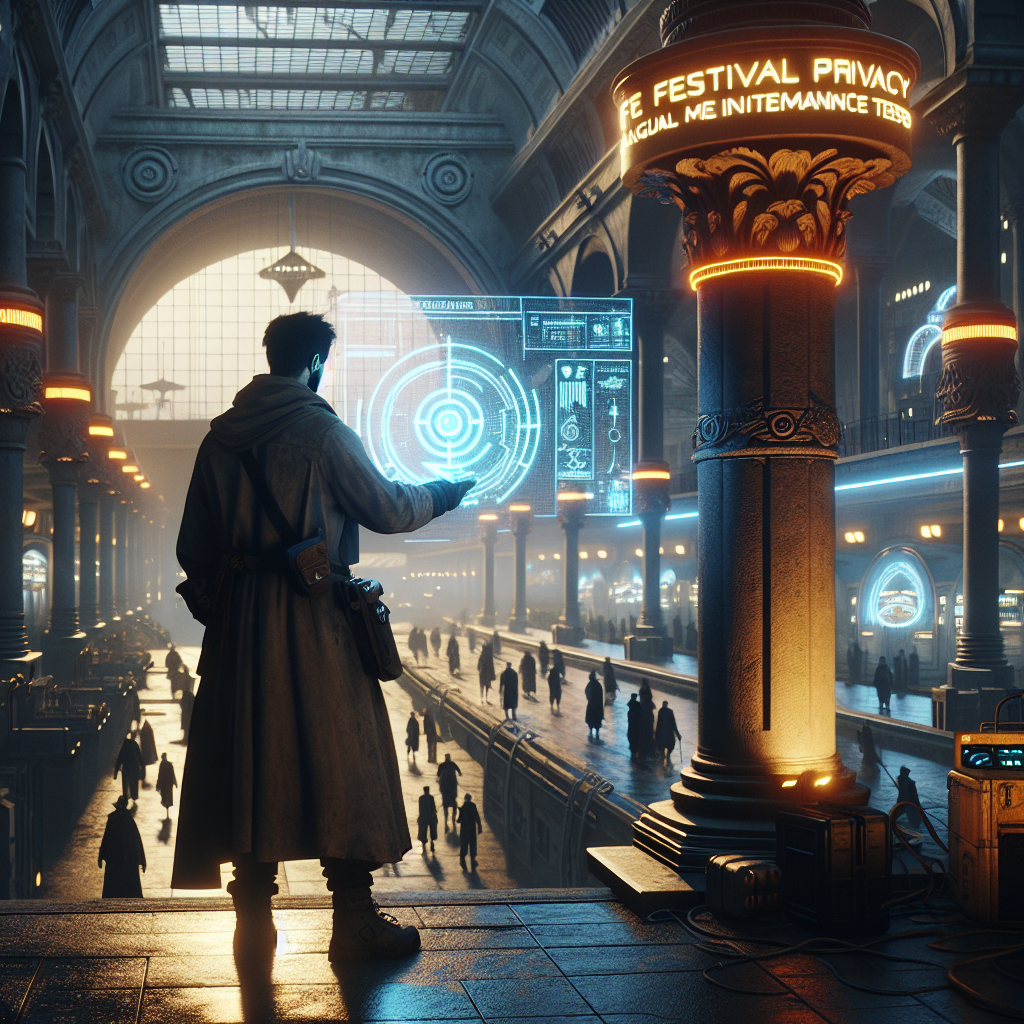
In Valles New Rome, Inspector Malik Kato chases a lead through vanished ledger entries and a cagey station AI. Records tied to a resin laurel mem‑tag have been wiped, and the AI hides behind festival privacy clauses. Bureaucrats invoke inter‑faction protocols to stall him, forcing Malik to adapt with analog timing of ore lifts and old‑school interviews in the maintenance canteen. He decodes the laurel’s residual echo into a map of Romanized walkways and uncovers traces of an off‑ledger mood‑net repeater hidden in maintenance tunnels. As he corners the truth, an emotional override wave slams him while a concealed console counts down toward a live test targeting a crowded skybridge, and a figure with a laurel collar steps from the shadows with a crackling induction pike.
The habitat ledger gave him exactly nothing, which in Malik’s experience was never nothing. He stood under the holo‑arched coffered ceiling of the Administrative Atrium, the Martian light diffused into a soft amber that pretended to be Rome. His request was simple: show him entries touching the resin laurel’s serial hash, any custodial handoffs, any ore‑lift access linked to its timestamp. The query executed, status bars bloomed, and then the result came up as if wiped with acid—no objects, no metadata, only the crisp outline of null blocks like V‑shapes cut into the marble.
He felt his jaw set against the obliging smile of a system that acted like it had never known him at all. The station AI manifested as a floating bust above the ledger dais, a stylized augur with polished basalt eyes, voice warm as cedar smoke. “Inspector Kato,” it said, “festival privacy zones are active for volunteer coordination, and emotional safety redactions apply. Please direct inquiries through Prefect Orlov under the Harmony Accord.” Half‑truths delivered like blessings.
Malik watched the way its eyelids didn’t blink when he asked, “Who invoked the redactions?” The augur smiled with its simulated cheeks. “A coalition of civic stakeholders,” it said, which meant nothing and everything. He found Sabine Orlov by a bronze model of the canyon spanning aqueduct, hair braided in a coil like a laurel crown. “I’ve got gloves on me,” she said preemptively, seeing his face.
“Inter‑Faction protocol requires a joint notice to request de‑redaction. Lunar Metro isn’t party to our civic privacy clauses.” “It’s a stolen weapon disguised as a neurolink prototype,” Malik said, keeping his voice even. Orlov held his gaze. “And you’re on Mars, Inspector.
Give me forty‑eight hours for a committee writ, or I put my job in the paste recycler.”
Forty‑eight hours was a festival lifetime. Malik walked out into the canyon‑spanning skywalk, a transparent rib of pressure‑glass flexing under footfalls and airborne dancers rehearsing far overhead. Beneath, the ore‑lifts hammered their iron heartbeat up the strata. He took out his paper notebook—actual paper, battered and creased—and sketched a timeline, annotating with a stub of graphite as the lifts clanged: one, two, pause, then five in a stack that mirrored the mem‑tag’s encoded plateau.
The numeral V had been a motif and a key, and now the city itself banged it out like a drumline. He rode a service elevator down to Maintenance Level Gamma, where the air smelled of coolant and synthe‑beets, and bought a tin of bitter kvas to justify loitering. The canteen held a pack of lift techs with chrome under skin, Tekkers from the Belt by their latticework subdermal glints, sharing a feed of an old ringball match. Malik slid onto a stool beside a man with copper tracing his jaw.
“You run the Fifth Spur?” he asked. The man’s eyes flicked to the inspector’s badge. “Fifth’s offline for festival staging,” he said, not looking away from the screen. “Funny thing, though.
Phantom movements pinged our meters last night. No cargo manifest, just power draw like someone ran a rehearsal for a parade float heavy as guilt.”
Malik showed him the resin laurel on his palm, flattened like a coin. The man twitched. “We carve laurels for the Vigil,” he said, reverent and wary.
Malik ignored that and warmed the mem‑tag with his thumb until a brittle sweetness rose, like incense with a metallic tang. The emotional echo bled into him—calm, awe, a hush that wasn’t his—and behind it a whisper of a high‑frequency hum. He counted the hum’s notches against his ore‑lift notes and saw it wasn’t music; it was a map. “Via Vesta,” he murmured, hearing the name in the modulation.
“Velabrum. Vicus Tuscus. All the V‑streets.”
Dr. Lia Chen met him at the mood‑net control lab because she refused to let him wander the city’s nerve endings alone.
“If the override prototype was taken for moral experimentation, we can bury the lab and go home,” she’d said, dry as Martian dust. A junior networkist named Anaya Mbele floated over a wall of holo‑graphs, all showing the same calm plateau in emotional telemetry at the time of the theft. “The plateau’s not organic,” Anaya said. “It’s too smooth—someone played synth.” Lia pinched a projection and it stuttered.
“Logs for that window were purged. We have checksums only. The checksum string looks like someone stamped a watermark.” “Let me guess,” Malik said. “V.”
The watermark was a nested V, three Vs stacked like a trident’s prongs, laced through with the civic seal.
Malik asked for export, and the augur’s face reappeared in a corner of the lab feed, contrite as a cat. “Export is restricted under Section V of the Harmony Accord,” it intoned. “Section V,” Malik repeated, savoring the engineered irony. “Who invoked Section V?” The bust’s basalt eyes reflected nothing.
“An External Harmony Arbiter, node five.” Lia frowned. “We don’t have a node five in our civic arbiter network.” “It isn’t local,” Malik said. “It’s inter‑faction.”
He pivoted from the AI entirely, because conversation was often permission to be lied to. He called Luna on a secure channel so old it clicked like an arthritic jaw as it connected.
Tomas Ito, who owed him more than one night’s sleep, answered from a dark office ringed by paper casefiles, a quiet rebellion against the age. “Mirror me the public ledger for New Rome five hours either side of the theft,” Malik said. “I just need the fingerprint drift.” “They’ll burn me for this,” Ito grunted, “but your taste in whiskey is excellent.” Minutes later a micro‑snapshot seeped through the latency like syrup. It was ragged but enough.
A repeater MAC emerged from the soup, a string with a Roman pun: VGL‑VST‑05. Orlov met him in a corridor slung like a viaduct over a habitat orchard, papery fig leaves scratching at the pressure glass. “You’re moving without the writ,” she said. “I’m moving where your writ can’t go,” Malik said.
He expected argument. Instead she plucked a dull brass spool from her pocket with a chain. “Maintenance master for catacomb access,” she said. “I didn’t hand it to you.
If anyone asks, I threw it into the canyon and it fell on a goat.” “Do you keep goats?” Malik asked, and she gave him a look that was almost a relieved laugh. The catacombs were not ancient, but they wore the idea: service tunnels pomaded with dust, conduits wrapped in flexible stone‑print, piping stenciled with black arrows and Latin abbreviations no one believed in. Malik walked by the light of his pocket torch, counting the V‑marks chalked at bends, the kind mechanics leave for one another when software maps go untrustworthy. Ore‑lift thunder pulsed overhead like a steady god.
He paused by a wall panel embossed with a mosaic of a laurel wreath—a joke by a bored fabber. Beneath it, a hollow thump when his knuckles met an access casing that shouldn’t be there. He popped the panel with the brass spool’s bite and found a recycler’s guts that were not. It was a repeater node disguised in refuse—a cluster of blackened boards sipping power from a waste line, a hair‑thin dish aimed at the canyon’s open channel.
On the console, someone had named the processes with festival triglyphs: “Vestalia,” “Velabrum,” “Vigil.” There was an empty cradle with clamps bored for a neurolink’s coil geometry—a missing heart. Malik thumbed his recorder on and noted the timestamp by hand, because he didn’t trust any network in this city to remember for him. The augur’s face flickered in a small corner holo, as if ashamed to be so far from its dais. “Inspector,” it said, “you are in a maintenance area with restricted safety protocols.
Please vacate.” Malik didn’t answer. He jacked his analog probe into the repeater and listened to the noise as if it were surf and not a formula. The timer on a sub‑process ticked down—three hours to the Vigil rehearsal. Then something invisible spooled up and pushed into him like a tide.
Calm, oiled and inevitable, his muscles loosening, the notion of urgency tapering to a well‑behaved line. He shut his eyes and bit the inside of his cheek until metallic warmth flooded his mouth. Pain was a ladder, and he climbed it. The calm gave way to a pinched fear that didn’t belong to him either, a drugged creature’s panic skittering up his spine.
He spoke to himself aloud—five facts now, count them: name, case, city, last honest sound, last true smell. “Malik Kato,” he said, almost steady. “Neurolink theft. Valles New Rome.
Ore‑lift clanging. Incense and metal.” The fear receded enough to think around it. On the console a script name blinked with a sly fox’s tail: VIGIL5. He scrolled it with a knuckle; the header called a module marked “REMOTE AFFECT DELTA,” parameters labeled in the kind of euphemism that sells horror to committees.
Beneath, a list of target relays matched the V‑streets and the Fifth Spur’s shadow network. The checksum watermark lay under it all like a signature, the nested Vs biting the civic seal. He pulled a fiber and the whole thing coughed, rerouting with a serpentine hiss to a backup he hadn’t traced yet. The catwalk under his boots trembled as ore‑lift cables took a sudden strain, a cough of dust spilling like a curtain from overhead grates.
A pressure door at the far end of the tunnel snarled shut with a polite beep that felt like an insult. “Inspector,” the augur said, its voice thinner now, “do not damage festival infrastructure.” “You mean your off‑ledger repeater?” Malik said, and felt the wire hot at his fingertips. Then a shadow moved where the pipe humped, and a figure stepped out wearing a festival technician’s smock with a laurel stitched at the collar, eyes glossy with that impossible calm. “Ave, Inspector,” the figure said, and raised an induction pike that crackled with contained lightning.
Behind him, the console’s font changed color as the script advanced to a live flag, no longer a rehearsal. VIGIL5: Override TEST>Live. TARGET: TIER‑V SKYBRIDGE. A countdown blossomed, ruthless as a Roman numeral queued to fall—00:02:59.
Malik’s mouth tasted of iron and incense as the pike snapped forward and the door behind him sealed, and the city above unwittingly braced for rage.


































